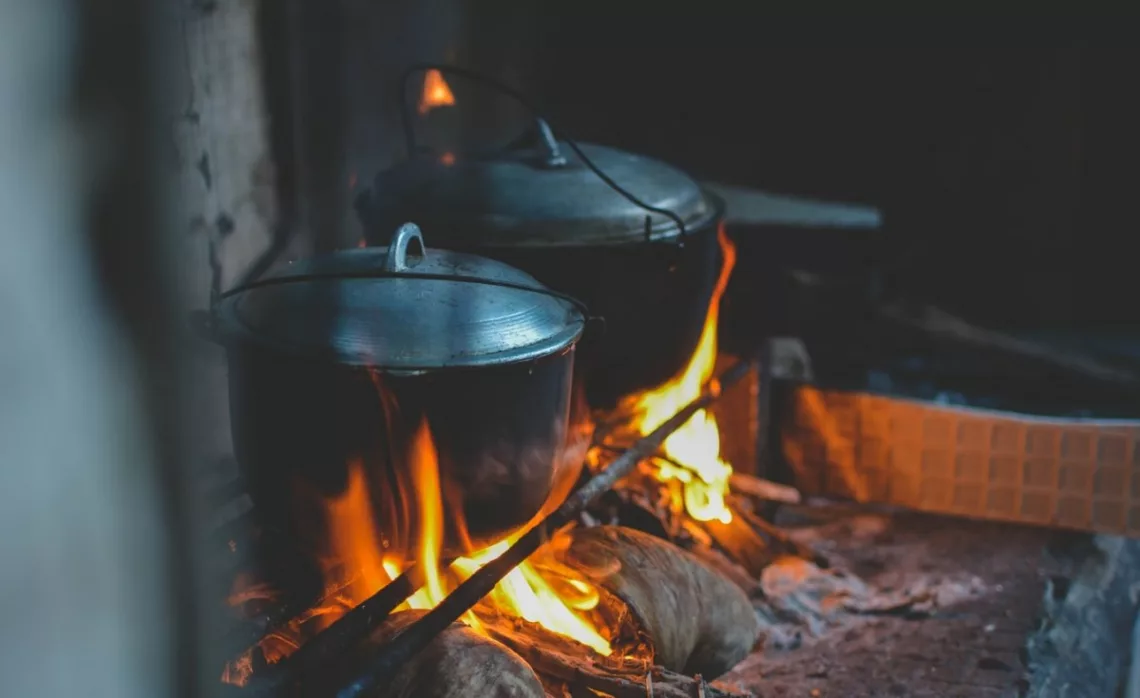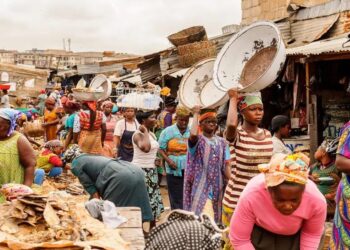As cooking gas prices soar in Nigeria, leaving many households grappling with increased expenses, a growing number of Nigerians are turning to charcoal stoves and firewood as primary cooking fuels due to their affordability and convenience, according to recent findings by NATIONAL ECONOMY.
A recent check revealed that as a result of further increase in the price of cooking gas, many Nigerians now take solace in the use of charcoal which has also led to the rise in its demand and price. Also, those who can’t afford the cost of charcoal are again switching to the use of firewood as alternative.
Several Nigerians, who shared their views with NATIONAL ECONOMY, expressed concerns about this disturbing trend.
“I have discontinued using cooking gas and now opt for firewood or charcoal, although their prices are also increasing rapidly. However, they are more affordable and last longer than gas,” she said.
Abiodun mentioned that she used to buy a 12.5kg cylinder of cooking gas for between N12,000 and N13,000 in 2023, but now it is sold for between N15,750 to N16,400.
“I cannot afford to spend that much solely on cooking gas,” she added.
Mary Ikoha, a businesswoman in Enugu, echoed similar sentiments, stating that she and her husband have switched to a firewood or charcoal stove due to the constant increase in gas prices.
She mentioned that the family’s size and the need for frequent boiling of water have made using cooking gas more expensive.
Evelyn Omacha, a civil servant, highlighted the challenges she faces due to the price hike.
“Using gas is my only option because I live on the fifth floor where I cannot use firewood or charcoal.
“So, I use my cooking gas judiciously by preparing all my meals at once and only using the gas to warm my food when needed,” she explained.
Abigail Ukachukwu, a restaurant owner also expressed how the price increase has adversely affected her business and profits. She noted that her restaurant, located in a residential area, cannot use charcoal stoves or firewood due to regulations.
“I hardly make any reasonable profit from this business because of the high gas expenses,” she lamented, appealing to the government for intervention.
Emmanuel Ijere, a corps member, mentioned resorting to an electric cooker but faces challenges during electricity outages. He emphasised the hardships faced by Nigerians in the current economic situation and urged the government to address their plight.
A recent report by the National Bureau of Statistics (NBS) reveals a 42.97 per cent increase in the average retail price to refill a 5kg cylinder of cooking gas, rising from N4,610.48 in March 2023 to N6,591.62 in March 2024. The price saw a monthly increase of 7.10 per cent from N6,154.50 in February 2024.
Comparatively, the price saw a monthly increase of 7.10 per cent from N6,154.50 in February 2024.
A state-level analysis shows that Kano had the highest average price at N7,609.00, followed by Ogun with N7,363.64, and Akwa Ibom at N7,162.50. In contrast, the lowest price was in Adamawa where the price was N5,312.50, with Taraba and Zamfara following at N5,375.00 and N5,550.00, respectively. Regionally, the South-South had the highest average price at N7,003.08, followed by the South-West where it sold at N6,723.22, and the North-East which had the lowest at N6,221.30.
Additionally, the average price to refill a 12.5kg cylinder of LPG increased by 5.77 per cent month-on-month from N15,060.38 in February 2024 to N15,929.04 in March 2024, and by 55.22 per cent year-on-year from N10,262.56 in March 2023.
State-level data indicate Sokoto as having the highest average price at N17,833.33, followed by Osun at N17,588.46, and Anambra at N17,417.65. The lowest prices were recorded in Katsina (N12,400.00), Kebbi (N13,137.50), and Bauchi (N14,484.25).
By zone, the South-South again recorded the highest average price at N16,859.85, with the South-East close behind at N16,734.87, while the North-East recorded the lowest at N14,943.48.
The blame game between the Nigerian Association of Liquefied Petroleum Gas Marketers (NALPGAM) and LPG terminal owners over high cooking gas prices underscores the complexities within the supply chain.
President of the Nigerian Association of Liquefied Petroleum Gas Marketers, Olatunbosun Oladapo, last month warned that if the federal government does not impose restrictions on the operations of the terminal owners, the price of 12.5 kg of LPG could rise to N18,000 by December.
He noted that the price for 20 metric tons suddenly increased from N9–N10 million to N14 million as a result of the naira devaluation.
Olatunbosun said, “Now, the ordinary man would not be able to buy gas. How many minimum wage earners can afford gas now? Everyone is turning to firewood and charcoal.”
Industry experts said such disputes may reveal underlying challenges in distribution, storage, or pricing strategies, all of which need addressing to stabilise and potentially lower cooking gas prices for consumers.
Addressing these issues is crucial to stabilise and potentially lower cooking gas prices for consumers, the NALPGAM said.
They opined that fostering collaboration and addressing supply chain issues could stabilise and lower cooking gas prices, benefiting both the economy and the environment. They also proposed reforestation and alternative energy adoption to mitigate environmental impacts.
While charcoal and firewood offer a cost-effective solution in the face of expensive cooking gas, they cautioned that their use comes at a significant environmental cost. Deforestation, air pollution, and ecosystem degradation are some of the consequences associated with increased reliance on traditional cooking fuels.
Nigeria’s Multidimensional Poverty Index 2022 sheds light on a concerning reality in the clean cooking sector. The statistics showed that households in various states classified as poor and vulnerable suffer from acute deprivation and only rely on old-fashioned, unsustainable cooking fuels, including dung, charcoal, and firewood.
Based on Nigeria’s energy transition plan, the key decarbonisation strategy for clean cooking is to move from traditional firewood, charcoal, and kerosene to LPG until 2030. Unfortunately, findings showed this may no longer be realistic.
Michael Itoro , an oil and gas expert said that rising prices for cooking gas could increase the financial burden for poorer citizens, which might, in turn, lead to reliance on cheaper but less efficient and potentially harmful alternatives such as firewood and charcoal, which can have a negative environmental as well as health impact.
He said, “The rise in firewood and charcoal usage instead of cooking gas can lead to deforestation and air pollution, causing the loss of ecosystems and biodiversity, and contributing to climate change and respiratory diseases.”
“Addressing the challenges of increasing cooking gas prices is crucial for a clean cooking sector,” he emphasised. “This can be achieved through government subsidies and targeted support programs to make clean cooking fuels more affordable for low-income households.
“Promoting renewable energy sources like biogas and solar cookers can mitigate environmental and health issues associated with traditional cooking fuels,” he added. “There are several cleaner alternatives for both high and low-income Nigerians,” he added.
He listed biogas, electric stoves, solar cookers, and improved cooking stoves as viable options. “Promoting and adopting these alternatives can reduce reliance on LPG and foster a cleaner cooking sector in Nigeria,” he said.
Regarding electric stoves, he noted, “While electric stoves are more common in urban areas and high-income households, challenges such as unreliable power supply and high purchase costs hinder their adoption in rural areas and among the poor,” he explained. “Addressing these barriers is crucial to promote cleaner cooking options like electric ovens.
“To achieve this, government initiatives such as improving rural electricity access and providing subsidies or financing for electric stoves in low-income households are essential,” he emphasised.
He also highlighted biogas as a clean and renewable energy source produced from organic waste, stating, “Biogas can be used in cooking as a clean and renewable energy source.”
Dr. Obadiah Ezekiel, an oil and gas professional in Nigeria, commented on the connection between the rising prices of LPG and potential deforestation in rural areas.
He explained, “The fact that LPG prices are on the rise may lead to the loss of more trees in rural areas. This increase in cooking gas prices is closely connected to the rise in crude oil prices and foreign exchange.”
Regarding alternatives, he mentioned solar cookers, stating, “Solar cookers use sunlight to heat and cook food. They are an environmentally friendly alternative that produces no emissions and do not require the use of fossil fuels.”
Environmental activist Mr. Newton Jibunoh emphasised the detrimental impact of tree felling for firewood in Nigeria, stressing that it leads to the loss of biodiversity. He highlighted that deforestation significantly reduces habitats for diverse plant and animal species, resulting in a notable decline in overall biodiversity.
According to Jibunoh, the crucial role trees play in preventing soil erosion cannot be overstated. He explained that their removal, as seen in the quest for firewood, can lead to diminished soil fertility and an increase in erosion rates.
He also drew attention to the role of trees in absorbing carbon dioxide, noting that widespread removal of trees for firewood contributes to elevated levels of greenhouse gases, thereby exacerbating the challenges posed by climate change.
“The significance of trees in regulating water cycles cannot be underestimated.Deforestation disrupts local hydrological patterns, potentially affecting water availability in the region,”he added.
The federal government announced in February of this year that it had stopped the exportation of Liquefied Petroleum Gas (LPG) to address the scarcity and soaring prices in the country.
When asked what the government has done to control the rising cost of domestic gas, Minister of State for Petroleum Resources, Ekperikpe Ekpo, stated at the Internal Stakeholders’ Workshop in Abuja that the ministry is in constant discussions with critical stakeholders such as the Nigerian Midstream and Downstream Petroleum Regulatory Authority, as well as operators like Mobil, Chevron, and Shell to address the issue.
He explained that by halting the export of locally-produced domestic gas, there would be more volume available for the domestic market, which would automatically reduce the price of the product.
However, experts are of the opinion that Nigerians shouldn’t be facing harsh economic realities in accessing food while also having difficulty using gas to cook. They noted that Minister Ekperikpe Ekpo’s announcement had not yielded positive results in reducing the price of the item locally. They blamed the rising prices on LPG producers secretly exporting the products.




